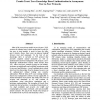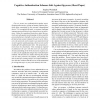398 search results - page 33 / 80 » Errors in Attacks on Authentication Protocols |
CEAS
2008
Springer
13 years 10 months ago
2008
Springer
The increasing use of email for phishing and unsolicited marketing has reduced the trustworthiness of email as a communication medium. Sender authentication is a known defense aga...
IFIP
2009
Springer
13 years 6 months ago
2009
Springer
The Trusted Platform Module (TPM) is a hardware chip designed to enable computers achieve greater security. Proof of possession of authorisation values known as authdata is require...
IPPS
2007
IEEE
14 years 2 months ago
2007
IEEE
Most of the current trust models in peer-to-peer (P2P) systems are identity based, which means that in order for one peer to trust another, it needs to know the other peer’s ide...
GLOBECOM
2007
IEEE
14 years 2 months ago
2007
IEEE
— A lightweight radio frequency identification (RFID) tag-reader mutual authentication scheme was recently proposed as an improvement over the original authentication protocol s...
SP
2006
IEEE
14 years 2 months ago
2006
IEEE
Can we secure user authentication against eavesdropping adversaries, relying on human cognitive functions alone, unassisted by any external computational device? To accomplish thi...


